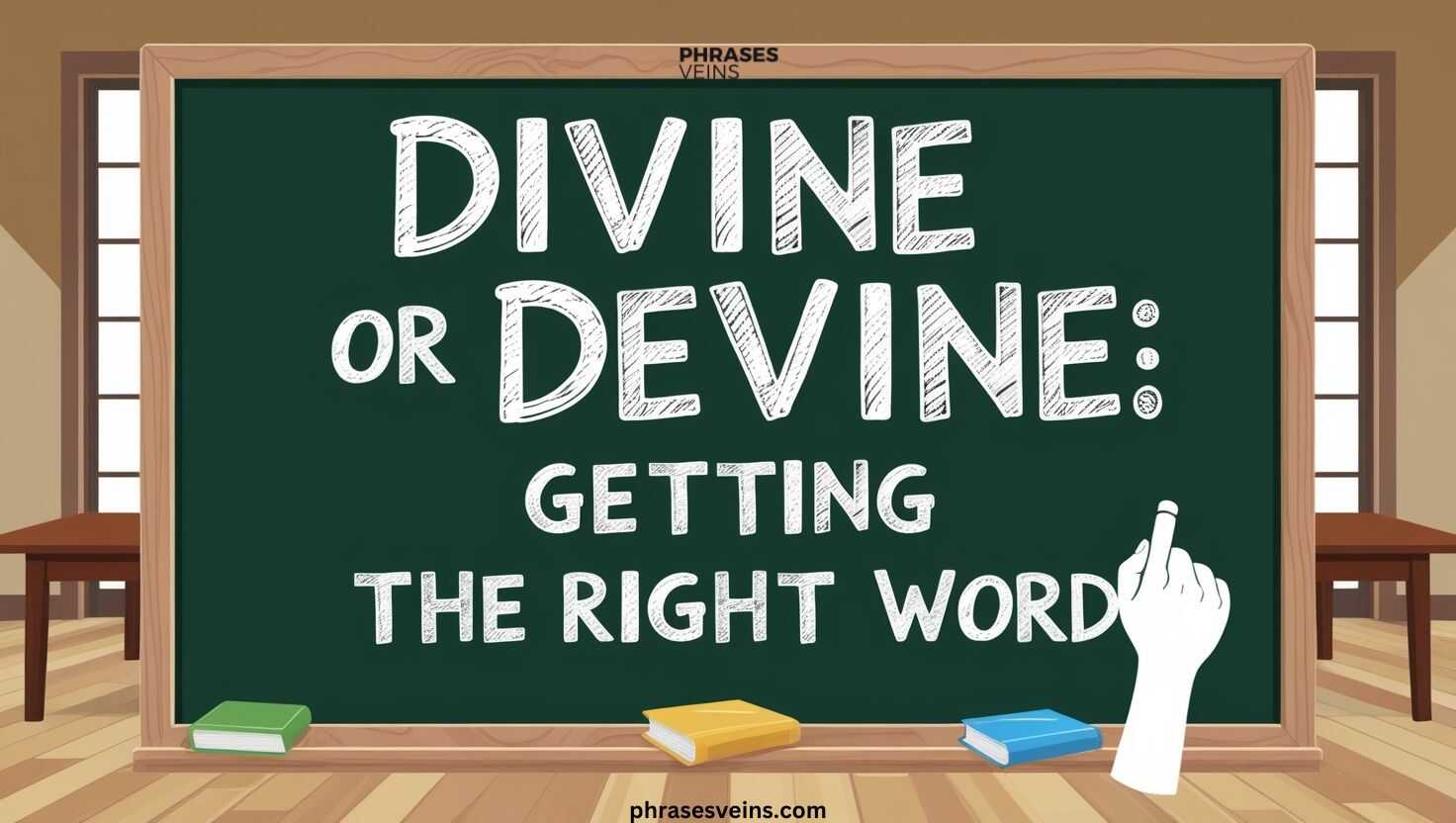Choosing the correct spelling of words can be tricky, especially when they sound the same but have different meanings. One such pair is “divine” and “devine”. Many English learners struggle with these confused words, leading to common spelling mistakes in both casual and formal writing.
This article will help you master the differences, explore the meaning of divine, and understand why these words often cause word confusion.By the end, you’ll be confident in using divine correctly, avoiding typo errors and improving your English proficiency. Let’s dive in and clarify the mystery of divine vs devine.
Correct Spelling and Grammar Rules
The accurate spelling of “divine” is critical to writing clearly and effectively. “Divine” is the correct word when describing something related to godliness, spiritual guidance, or extraordinary beauty. On the other hand, “devine” is often a misspelling and has no standard meaning in English unless used as a proper noun, such as a last name.
For those learning English, understanding the spelling guide for “divine” is essential. Double-checking your writing ensures you’re writing correctly and avoiding common spelling errors. Tools like spell-checkers and grammar software can help eliminate such mistakes.
How to Pronounce Divine
The correct pronunciation of “divine” is /dɪ-ˈvaɪn/. It has two syllables: “dih” and “vine.” Pronouncing it accurately helps in spoken accuracy and avoids confusion in conversations. If you’re unfamiliar with phonetics, try saying it aloud as “dih-VINE.”
English students or language learners often confuse “divine” with “devine,” especially in speech. Practicing phonetic correctness and listening to native speakers can improve your English fluency significantly.
Meaning of Divine
The definition of divine includes being related to godliness, spirituality, or something heavenly. For example, “divine intervention” refers to godly guidance or spiritual aid that helps people in extraordinary situations.
It also means something that exhibits breathtaking beauty or exceptional beauty. For instance, “The sunset was truly divine” describes its stunning appearance and unparalleled nature. Understanding the divine definition can enrich your vocabulary and make your writing more impactful.
Why Is There Confusion Between Divine and Devine?
The word confusion between “divine” and “devine” arises because they sound similar when spoken quickly. This misused word often appears in casual texts, emails, and even on signs due to typo errors or lack of awareness.
“Devine” is sometimes used as a proper noun, such as in names like “Devine Street.” However, in most cases, it’s simply an incorrect spelling of “divine.” Being mindful of these similar words is key to improving English skills.
Meaning of Devine
“Devine” does not have a standard meaning as a common word in English. It’s usually a surname or place name, such as “Devine, Texas.” This is why many English learners accidentally use it instead of “divine,” creating writing mistakes.
If you’re unsure whether to use “divine” or “devine,” remember that “divine” is the proper spelling for any context involving religious themes or breathtaking beauty. Double-checking your work can save you from these spelling mistakes. devine or divine
Using Divine in English
“Divine” is widely used in spiritual settings, literature, and everyday conversations. It often describes things associated with a higher power guidance or religious guidance. For example, “divine intervention” represents help from a higher power.
The word is also used metaphorically to express admiration. Saying “Her singing was divine” implies it was of extraordinary beauty. Mastering the usage examples of “divine” can make your writing and speaking more nuanced.
Common Mistakes to Avoid
A frequent mistake is using “devine” instead of “divine.” This is a common spelling error that occurs due to phonetic similarity. Proofreading and learning the spelling guide for “divine” can help eliminate these misspellings.
Avoid using “devine” unless it’s a name. For example, “Devine High School” is correct because it’s a proper noun. However, “This cake tastes devine” is incorrect; it should be “divine.” Practicing writing correctly will enhance your English education and communication skills.
Sentence Examples Using Divine
Here are some illustrative sentences to show the proper usage of “divine”:
| Sentence | Meaning |
|---|---|
| “The painting was divine.” | The artwork was of unparalleled beauty. |
| “We prayed for divine guidance.” | Seeking spiritual guidance or aid. |
| “That dessert was absolutely divine.” | The dessert was of exceptional quality. |
Using these context examples helps ESL learners grasp the word’s usage naturally.
READ MORE >>> Is it Hardwork or Hard Work? What is Correct in English?
Why It Matters
Spelling and using “divine” correctly can impact how others perceive your language skills. Incorrect usage, like “devine,” can make your writing seem unpolished. On the other hand, mastering such commonly confused terms enhances your credibility.
For those in fields like theology, literature, or creative writing, understanding sacred contexts and applying the word “divine” appropriately adds depth to your work. Even casual writers benefit by avoiding common spelling errors and improving their English skills.
How to Spell Devine: Common Misspelling or Unique Name?
When it comes to spelling, words like “devine” often cause confusion. Many people wonder if “devine” is a correct spelling or simply a typo of the word “divine.” Let’s explore the meaning, usage, and spelling of this term, along with examples to clarify its proper use.
The Correct Spelling: Divine
The word “devine” is often a common misspelling of “divine,” which means something extraordinary, godly, or heavenly. The word “divine” comes from the Latin term divinus, associated with deities or something of exceptional beauty and value.
Is “Devine” a Word?
Yes, “devine” can be a word! However, its usage is more commonly found as a proper noun, such as a surname (e.g., “The Devine family”). It is not a recognized synonym for “divine” in formal writing.
Examples of Usage
- Incorrect: “The sunset looked devine.”
Correct: “The sunset looked divine.“ - Proper Noun: “Mr. Devine is our teacher this semester.”
Synonyms for Divine
Here are some alternatives you can use instead of “divine”:
- Heavenly
- Godlike
- Angelic
- Magnificent
- Transcendent
How to Avoid Spelling Errors
- Always double-check your writing using a spell checker to catch errors like “devine.”
- Remember the meaning and context of “divine,” which helps ensure its correct usage.
- Use mnemonics to remember the proper spelling: Think of “divine” as being related to “deity.”
Frequently Asked Questions
Which one is correct, devine or divine?
The correct spelling is “divine” when referring to something godly, heavenly, or extraordinary. “Devine” is a common misspelling, but it can also be used as a proper noun, such as a surname.
What does devine mean?
“Devine” is often a typo of “divine,” but as a proper noun, it is commonly used as a surname or a unique name. It is not interchangeable with “divine” in formal English.
What is Devine used for?
“Devine” is primarily used as a proper noun, such as in names (e.g., “Mr. Devine” or “The Devine family”). It’s not used to describe something extraordinary or heavenly.
How do you use divine?
You can use “divine” to describe something exceptional, godly, or sacred. For example:
- “Her performance was simply divine.“
- “The painting had a divine beauty.”
Conclusion
In summary, “divine” is the correct word to describe religious themes, breathtaking beauty, or spiritual guidance. The definition of divine spans many areas, making it a versatile word in English. Avoid the misspelling “devine,” as it’s rarely correct outside of proper nouns.
By focusing on proper spelling, understanding the meaning of divine, and using it in context examples, you’ll elevate your writing and communication. Always aim for accuracy and clarity in your language—because small improvements in English proficiency make a big difference.

Welcome to PhrasesVeins, where Arabella Reed brings language to life. With a passion for grammar and phrases, Arabella offers unique insights to help you master language and enhance your expression. Whether you’re a language enthusiast or looking to improve your skills, Arabella’s work guides you through the beauty of words.

